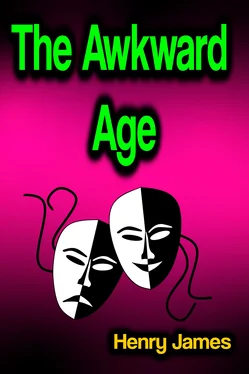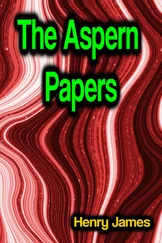I see now of course how far, with my complications, I got away from Gyp; but I see to-day so much else too that this particular deflexion from simplicity makes scarce a figure among the others after having once served its purpose, I mean, of lighting my original imitative innocence. For I recognise in especial, with a waking vibration of that interest in which, as I say, the plan of the book is embalmed for me, that my subject was probably condemned in advance to appreciable, or more exactly perhaps to almost preposterously appreciative, over-treatment. It places itself for me thus in a group of small productions exhibiting this perversity, representations of conceived cases in which my process has been to pump the case gaspingly dry, dry not only of superfluous moisture, but absolutely (for I have encountered the charge) of breathable air. I may note, in fine, that coming back to the pages before us with a strong impression of their recording, to my shame, that disaster, even to the extent of its disqualifying them for decent reappearance, I have found the adventure taking, to my relief, quite another turn, and have lost myself in the wonder of what "over- treatment" may, in the detail of its desperate ingenuity, consist of. The revived interest I speak of has been therefore that of following critically, from page to page, even as the red Indian tracks in the forest the pale-face, the footsteps of the systematic loyalty I was able to achieve. The amusement of this constatation is, as I have hinted, in the detail of the matter, and the detail is so dense, the texture of the figured and smoothed tapestry so loose, that the genius of Gyp herself, muse of general looseness, would certainly, once warned, have uttered the first disavowal of my homage. But what has occurred meanwhile is that this high consistency has itself, so to speak, constituted an exhibition, and that an important artistic truth has seemed to me thereby lighted. We brushed against that truth just now in our glance at the denial of expansibility to any idea the mould of the "stage-play" may hope to express without cracking and bursting—and we bear in mind at the same time that the picture of Nanda Brookenham's situation, though perhaps seeming to a careless eye so to wander and sprawl, yet presents itself on absolutely scenic lines, and that each of these scenes in itself, and each as related to each and to all of its companions, abides without a moment's deflexion by the principle of the stage-play. In doing this then it does more—it helps us ever so happily to see the grave distinction between substance and form in a really wrought work of art signally break down. I hold it impossible to say, before "The Awkward Age," where one of these elements ends and the other begins: I have been unable at least myself, on re-examination, to mark any such joint or seam, to see the two DISCHARGED offices as separate. They are separate before the fact, but the sacrament of execution indissolubly marries them, and the marriage, like any other marriage, has only to be a "true" one for the scandal of a breach not to show. The thing "done," artistically, is a fusion, or it has not BEEN done—in which case of course the artist may be, and all deservedly, pelted with any fragment of his botch the critic shall choose to pick up. But his ground once conquered, in this particular field, he knows nothing of fragments and may say in all security: "Detach one if you can. You can analyse in YOUR way, oh yes—to relate, to report, to explain; but you can't disintegrate my synthesis; you can't resolve the elements of my whole into different responsible agents or find your way at all (for your own fell purpose). My mixture has only to be perfect literally to bewilder you—you are lost in the tangle of the forest. Prove this value, this effect, in the air of the whole result, to be of my subject, and that other value, other effect, to be of my treatment, prove that I haven't so shaken them together as the conjurer I profess to be MUST consummately shake, and I consent but to parade as before a booth at the fair." The exemplary closeness of "The Awkward Age" even affects me, on re-perusal, I confess, as treasure quite instinctively and foreseeingly laid up against my present opportunity for these remarks. I have been positively struck by the quantity of meaning and the number of intentions, the extent of GROUND FOR INTEREST, as I may call it, that I have succeeded in working scenically, yet without loss of sharpness, clearness or "atmosphere," into each of my illuminating occasions— where, at certain junctures, the due preservation of all these values took, in the familiar phrase, a good deal of doing.
I should have liked just here to re-examine with the reader some of the positively most artful passages I have in mind—such as the hour of Mr. Longdon's beautiful and, as it were, mystic attempt at a compact with Vanderbank, late at night, in the billiard-room of the country-house at which they are staying; such as the other nocturnal passage, under Mr. Longdon's roof, between Vanderbank and Mitchy, where the conduct of so much fine meaning, so many flares of the exhibitory torch through the labyrinth of mere immediate appearances, mere familiar allusions, is successfully and safely effected; such as the whole array of the terms of presentation that are made to serve, all systematically, yet without a gap anywhere, for the presentation, throughout, of a Mitchy "subtle" no less than concrete and concrete no less than deprived of that officious explanation which we know as "going behind"; such as, briefly, the general service of co-ordination and vivification rendered, on lines of ferocious, of really quite heroic compression, by the picture of the assembled group at Mrs. Grendon's, where the "cross-references" of the action are as thick as the green leaves of a garden, but none the less, as they have scenically to be, counted and disposed, weighted with responsibility. Were I minded to use in this connexion a "loud" word— and the critic in general hates loud words as a man of taste may hate loud colours—I should speak of the composition of the chapters entitled "Tishy Grendon," with all the pieces of the game on the table together and each unconfusedly and contributively placed, as triumphantly scientific. I must properly remind myself, rather, that the better lesson of my retrospect would seem to be really a supreme revision of the question of what it may be for a subject to suffer, to call it suffering, by over-treatment. Bowed down so long by the inference that its product had in this case proved such a betrayal, my artistic conscience meets the relief of having to recognise truly here no traces of suffering. The thing carries itself to my maturer and gratified sense as with every symptom of soundness, an insolence of health and joy. And from this precisely I deduce my moral; which is to the effect that, since our only way, in general, of knowing that we have had too much of anything is by FEELING that too much: so, by the same token, when we don't feel the excess (and I am contending, mind, that in "The Awkward Age" the multiplicity yields to the order) how do we know that the measure not recorded, the notch not reached, does represent adequacy or satiety? The mere feeling helps us for certain degrees of congestion, but for exact science, that is for the criticism of "fine" art, we want the notation. The notation, however, is what we lack, and the verdict of the mere feeling is liable to fluctuate. In other words an imputed defect is never, at the worst, disengageable, or other than matter for appreciation—to come back to my claim for that felicity of the dramatist's case that his synthetic "whole" IS his form, the only one we have to do with. I like to profit in his company by the fact that if our art has certainly, for the impression it produces, to defer to the rise and fall, in the critical temperature, of the telltale mercury, it still hasn't to reckon with the engraved thermometer-face.
Читать дальше












